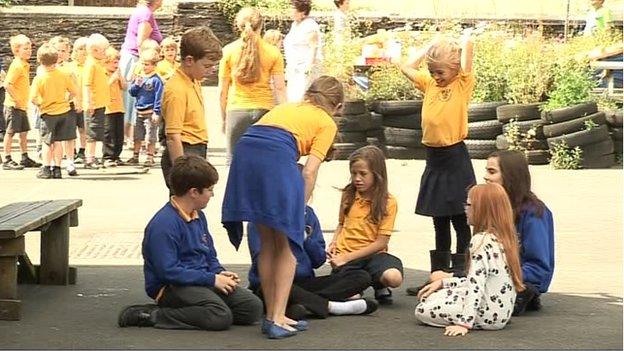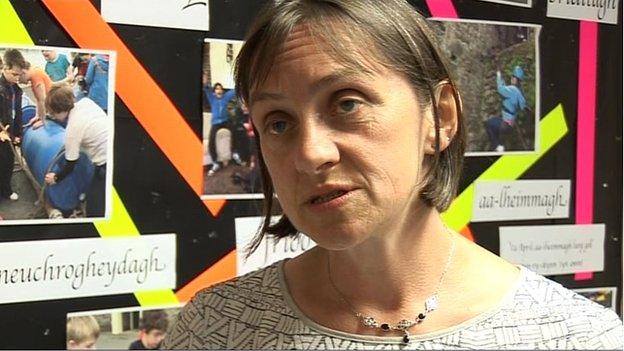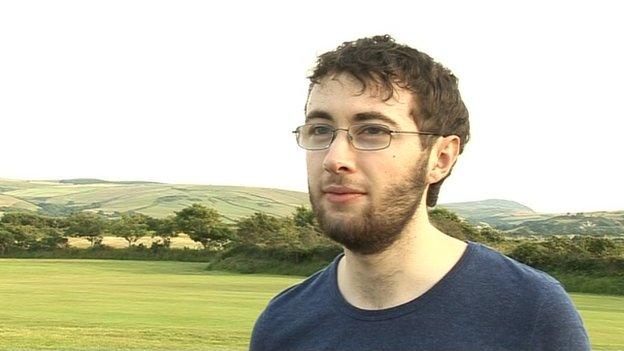Can Northern Ireland learn lessons from the world's only Manx-speaking school?
- Published

About 70 pupils attend Bunscoill Ghaelgagh, the world's only Manx-speaking school
As you approach the front gates it is clear this is not an ordinary school.
The pupils do not look twice at the camera or recording equipment; TV and radio crews are here all the time.
In the playground some of the children whisper in English.
They know they should not be speaking the language, even though the school is in the very heart of the British Isles.
About 70 pupils attend Bunscoill Ghaelgagh, the world's only Manx-speaking school.
The primary school is situated in St John's village in the Isle of Man and the children are taught all their lessons solely in Manx Gaelic.
"We weren't sure where to start," says head teacher Julie Matthews.

Bunscoill Ghaelgagh head teacher Julie Matthews went on a fact-finding language trip to Northern Ireland
"We thought we'd go across to Northern Ireland, have a look and see what's there, because the Northern Irish Gaelic is similar to the Manx Gaelic.
"We went to Belfast, looked at the Cultúrlann (cultural centre), went to two or three schools there, and had a really good time, finding out what they do," she says.
Their fact-finding trip took them to schools in Ballycastle, County Antrim, and Rathlin Island off the Antrim coast.
'Extinct'
Staff at Bunscoill Ghaelgagh are now helping to lead a revival of Manx Gaelic in the Isle of Man.
In the 1980s, just a few dozen speakers of Manx remained.
By 2009, a United Nations report incorrectly stated the language was extinct; a claim the UN has since amended., external
There are now hundreds of speakers, and the number is growing.

The Isle of Man's population has embraced Manx Gaelic, but the language has not been forced on schoolchildren
Manx Gaelic has the full support of the island's government and can be seen on everything from street signs to buses.
Fluent speakers are still modest in number but the revival has not proven to be culturally divisive.
On the contrary, it is embraced by the vast majority of residents. This is perhaps surprising, as half the island's population was not born there.
'Not political'
The support for Manx Gaelic is catching the attention of influential figures in Northern Ireland, including Prof Ailbhe Ó Corráin, who is head of Irish and Celtic Studies at the University of Ulster.
"One thing that we could really learn from both Scotland and the Isle of Man is to see the Gaelic languages as something that is not political, that is not the preserve of any particular faction, political grouping, political ideology or viewpoint, or of any particular religion," he says.

Manx Gaelic is now widely seen in public life and appears on everything from street signs to buses to postal vans
Pupils of the Bunscoill have the choice to continue to learn in Manx when they progress to high school, but the available subjects and resources are limited.
This is something the education authorities are trying to develop.
"When they ran out of Manx to teach me they started teaching me Irish," says Christopher Lewin, who has spoken Manx since an early age.
"I then did a GCSE in Irish from an exam board in Belfast.
"Irish, Manx and Scottish Gaelic are very similar to each other, you can almost call them dialects.
"If you know Irish already, you'll find Manx strange for a while, but it's fairly easy to get into and vice versa," he says.

Manx speaker Christopher Lewin said he learned Irish when his teachers ran out of Manx lessons
The island also has a series of popular pre-school groups called Mooinjer Veggey, which have a strong Gaelic ethos.
So what is the secret to the language's revival?
Every senior figure in teaching I spoke to said the same: Manx is not forced on students.
Expansion
People who want to learn the language come to it organically and it is not imposed on those who have no interest in it.
The Bunscoill Ghaelgagh recently celebrated its 13th anniversary and the Manx education service is continuing to expand.
When the last native speaker, Ned Maddrell, died in the 1970s some people declared the beginning of the end for Manx Gaelic.
It seems they, like the UN, have been proved wrong.
You can see more on this story on BBC Newsline, BBC One Northern Ireland on Monday 15 September at 18:30 BST.